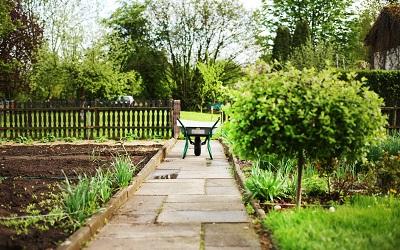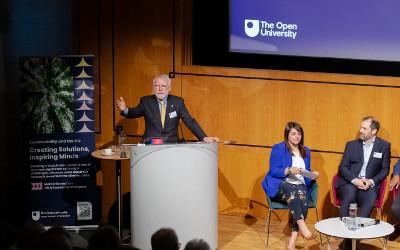Day 247, Year of #Mygration: Refugee Allotment Project

In today’s blog post, Dr Fidèle Mutwarasibo, Visiting Research Fellow in the OU's Centre for Voluntary Sector Leadership, highlights how a Refugee Allotment Project in Plymouth has proven to be a powerful, low-cost, integration initiative.
The impact of migration felt in the community plays a critical role in the settlement of refugees and migrants in their midst. The local community is where integration in the main happens. While there is a cost associated with migrants and refugees’ integration, there are things that can be done by ordinary people to promote integration while the heavy lifting work is left to the central, regional and local governments. Local integration works when there is buy-in by all stakeholders; refugees and migrants alone can do so much. As we approach the end of 2018, we are encouraged to play our part in making integration at the local level a first step in the integration process.
Positive stories in immigration are hard to come by. Media coverage of the issue tends to focus on what happens at the border and the rhetorical comments by those who have made immigration a political football. The coverage in the recent past has focused on dealing with flows through the Mediterranean and fears about the composition and character of those who are part of the migrant caravan in Central America and Mexico. Having said that, we recently celebrated two successes in the US elections – Ilhan Omar and Rashida Tlaib. Good stories and achievements in integration do happen in our communities, often away from the media’s radar.
A recent report in the media caught my eye. It was a report on asylum seekers and refugees working on allotments in Plymouth. The report on ITV highlighted how allotments were bringing asylum seekers, refugees and the broader population together. The Refugee Allotment Project has helped participants to develop a sense of belonging. This experience is captured in Azeb Mengistead’s quotation “Plymouth is a [...] nice place and people are helpful, never [...] ignore you”. Azeb's views are endorsed by volunteers who support the refugee allotment project. They describe the project as a "godsend". The benefits of the Refugee Allotment Project are well articulated by Jumeyi Akoh (Students and Refugees Together) in this quote “It's a place to relax, talk with other people, to grab a picnic together, to practice English. They like the serenity, the closeness with nature, the fact that they're getting their hands dirty and putting in a day's work. It's a godsend, some of them come here every day to relax, to stay quiet and listen to the birds and have some peace”.
I wonder how many stories as moving as the one in Plymouth there are in the United Kingdom. Unfortunately, many experiences of successful integration initiatives don't make their way to the public arena or indeed get the media attention they deserve. The debate tends to focus on security and the fears and prejudices held by a section of the population which may have legitimate concerns about the impact of immigration. I was recently asked by a friend to give my views on the difference between local integration and national integration strategy (or lack thereof).
I am a firm believer in local citizenship. Unlike conventional citizenship, local citizenship entails engaging in activities that are happening where one lives rather than focusing on politics at a national level. My experience has served me well, wherever my life journey took me. Engaging in local integration has made my integration seamless. Moreover, this was only possible because I managed to meet members of the established communities (I prefer the concept to natives), willing to act as mentors and cultural mediators. One of the examples of the importance of having local connections that comes to my mind is when a friend was ill, and I was not sure what to do. In my home culture, when a person is sick or has a party, you don't need an invitation. You invite yourself. Not visiting a friend who is sick is considered anti-social. I was aware that in the West, you don’t show up without an appointment, especially at the hospital. A quick call to a cultural mediator helped to sort out the puzzle. A phone call to the friend eased the visit to the hospital. The visit cemented the relationship. It is not clear what would have happened had I just showed up at the hospital, but there is no doubt that my invitations for tea might have ceased. My learning helped me to develop and lead mentoring programmes and leadership programmes for refugees and other migrants to create opportunities for interactions. These programmes helped and enabled migrants and refugees to meet and interact with local from the established communities, whom they would not have met otherwise without such interventions. In some cases, these initiatives led to long-term friendships, which at times expanded to include members of the families of mentees and mentors. A mentee who participated in one of the programmes I led said that the mentoring programme helped: ‘I got to make friends and had someone to lead me through the maze of education in ...’
I have heard many similar initiatives in my social practices from others. The uniqueness of the Refugee Allotment Project is that refugees and migrants work together with members of the local community on a joint endeavour and out in the open space. The initiative highlights the fact that though money and other resources are necessary for integration, there is a lot that we can do to support local integration that does not require much money. The most important resource, in this case, is time. Committing time to assist others while doing something that is good for your health such as exercise. Making a difference while also helping yourself is very important in this context. The project should inspire small community initiatives aimed at welcoming refugees in our communities.
In conclusion, governments can facilitate integration through funding and providing the opportunity to engage in integration initiatives. Moreover, it is down to the individual refugees and migrants as well as members of the established communities to participate and embark on a journey of mutual learning. One of the key lessons from my work in the migration and integration spheres is the value of seeing things from other people’s perspectives. Having an open mind, engaging with others can make a difference in one’s life, whether we are refugees, migrants and locals as in local.
Quarterly Review of Research
Read our Quarterly Review of Research to learn about our latest quality academic output.

Contact our news team
For all out of hours enquiries, please telephone +44 (0)7901 515891
